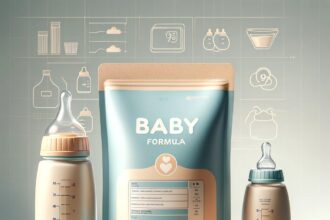Preemie formula is a specially designed baby formula that provides more nutrients, protein, and vitamins than regular baby formula to help premature babies grow and gain weight. While effective, it also carries a higher risk of necrotizing enterocolitis (NEC), a potentially fatal intestinal disease.
What Is Preemie Formula?
Preemie formula is crucial for boosting the growth and development of premature babies. While breast milk from the baby’s mother is ideal, it’s not always feasible. Regular baby formula is nutritionally adequate for full-term infants but lacks the extra nutrients preemies need for optimal growth, particularly for bone development.
Babies typically develop their bones during the 27th to 40th week of pregnancy, which preemies miss out on. Therefore, preemie formula contains higher levels of calcium, phosphate, folic acid, and vitamins D, E, and K, as well as iron, to support bone growth and overall development.
Preemies usually stay in the neonatal intensive care unit (NICU) for observation and specialized care. During this time, they are often fed preemie formula or breast milk fortified with a human milk fortifier.
Types of Preemie Formula
There are different types of preemie formula to meet a baby’s specific needs. Homemade baby formula is not recommended due to safety concerns and the need for proper nutrition.
- Amino Acid-Based Formula: Recommended for preterm infants with cow’s milk allergies or difficulty digesting fat. These formulas use simple amino acids instead of milk protein. Popular brands include EleCare, Enfamil Nutramigen AA, and Neocate.
- Lactose-Free Formula: Suitable for preemies who cannot digest lactose, the sugar in cow’s milk. However, some lactose-free formulas still contain dairy proteins, so soy-based formulas may be used instead. Popular brands include Similac Sensitive and Enfamil LactoFree.
- Hypoallergenic Formula: Designed for babies with soy and cow’s milk allergies, hypoallergenic formula helps prevent atopic disease and treats milk protein allergies in high-risk infants. Popular brands include Similac Alimentum and Enfamil Nutramigen.
Understanding Preemie Formula Side Effects
Preemie formula is crucial for the growth and development of premature babies, but it can also have side effects. Most side effects are related to digestion and may include gas, upset stomach, or diarrhea. Babies with cow’s milk or soy allergies may experience digestive and skin issues, and in severe cases, breathing problems.
Necrotizing Enterocolitis (NEC)
One of the most serious side effects is necrotizing enterocolitis (NEC), an inflammatory bowel disease that can cause tissue in the intestines to die. This condition can lead to intestinal wall rupture, allowing bacteria into the blood and causing sepsis, a severe blood infection. Approximately one in 1,000 preemies develops NEC, and studies show that those on exclusive formula diets are at the highest risk.
When to Stop Using Preemie Formula
Parents should consult their baby’s doctor if they notice any adverse reactions. Switching or stopping formula without medical advice is not recommended. Doctors will monitor the baby’s growth to determine when it’s safe to transition to regular formula or breast milk. Preemies typically catch up to full-term babies’ size within their first year.
Preemie Formula Lawsuits
Some parents have filed lawsuits against manufacturers like Mead Johnson and Abbott Laboratories after their preemies developed NEC from cow’s milk-based formulas like Enfamil and Similac. Human milk fortifiers made from cow’s milk are also included in these lawsuits. Allegations include failure to warn about NEC risks and continuing production despite known risks.
Recalls
While there have been no recalls specifically related to NEC, Abbott issued a recall for some Similac lots in February 2022 due to potential Cronobacter bacteria contamination at its Michigan factory.



















